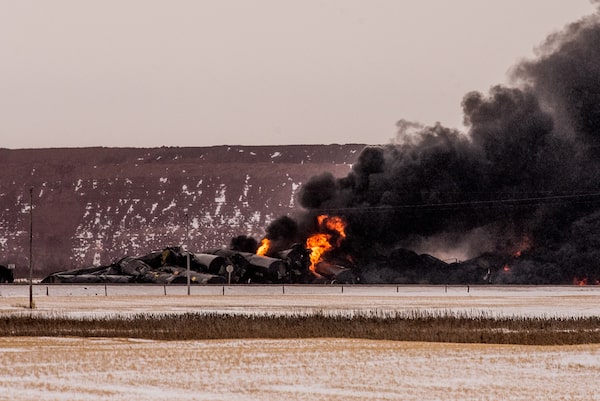
Smoke billows up from a derailed Canadian Pacific Railway train near Guernsey, Sask., on Feb. 6, 2020.Matt Smith/The Canadian Press
The federal government has ordered lower speed limits for all trains carrying dangerous goods on Canada’s railway lines after a train jumped the tracks in rural Saskatchewan early Thursday morning, bursting into flames and causing the evacuation of a small community.
A Canadian Pacific Railway freight train carrying crude oil derailed around 6:15 a.m. near Guernsey, 115 kilometres southeast of Saskatoon. Thirty-one of 104 cars left the tracks and a dozen caught fire, the Saskatchewan Public Safety Agency said. CP said in an e-mailed statement there were no injuries and no impacts to waterways.
Black smoke billowing over Guernsey on Thursday marked the second derailment in a matter of weeks near the tiny community of about 85 people. On Dec. 9, a CP train with 19 cars ran off the tracks about 10 kilometres to the west, causing a major blaze and leaking 1.5 million litres of oil.
Jack Gibney, reeve of the Rural Municipality of Usborne, which includes Guernsey, told The Globe and Mail he wants Prime Minister Justin Trudeau to know the incident had residents worried for their safety.
“You tell Mr. Trudeau down there that a pipeline needs to be put in place, because this CP rail line … is the main line for oil cars,” Mr. Gibney said. ”The concerning part is that you see them out doing repairs on this line, but how come it’s happening in this area so bad.”
The speed limit for trains hauling dangerous goods – including oil, propane and chemicals – is 40 miles an hour (64 km/h) in cities and 50 mph (80 km/h) in other areas. Transport Minister Marc Garneau issued a ministerial order in response to the derailment on Thursday, cutting by half the speed limit for trains pulling 20 or more cars of dangerous goods.
The order is in effect for 30 days beginning on Feb. 7, he said, “although we are asking the railways to implement it immediately.”
“I want to say we could shorten that,” Mr. Garneau told reporters in Ottawa on Thursday. “We’re looking for the causes to see if there’s a common pattern, or we could lengthen it, depending on how things are progressing.” He said he is aware the economy could be affected, ”but it is very, very important that we do not sacrifice safety.”
On Thursday morning, a makeshift evacuation centre was set up at Lanigan town hall, about 12 kilometres east of Guernsey.
As members of the Lanigan fire department went door-to-door in Guernsey telling residents they would have to leave, volunteers descended on the town hall. There they cooked breakfast for those who would soon arrive from Guernsey on buses supplied by the local school district and the nearby BHP Billiton Jansen potash mine.
Mr. Gibney said a few older residents were taken to Lanigan hospital.
“They were on oxygen. It was a real stress to move them out of their houses,” he said. “We still have a few [Guernsey] residents that refuse to go, but there’s not a lot we can do about it.”
By Thursday afternoon, all evacuees had been placed for the evening.
For an industry that tracks and publishes the average speed of its trains on a weekly basis, lower speed limits are unwelcome. Railways are under pressure from customers, investors and, when it comes to grain, the government, to move more goods quickly. Much of Canada’s rail network is single-track, and other than the occasional siding, has no passing lanes. This means when an oil train slows down, so does the grain train behind it.
The amount of oil moving on the rails has risen sharply in the past few months, driven by a shortage of pipeline capacity and the easing of production curtailments in Alberta.
In the final three months of 2019, CP said it moved a record 36,000 rail cars of oil, and expects to beat that pace this year.
Jonathan Abecassis, a spokesman for Canada’s largest rail carrier, Canadian National Railway Co., said on Thursday the new speed limit will have a “significant impact on our operations.”
In 2014, the late Hunter Harrison, then chief executive officer of CP Rail, complained about calls for tougher regulations, including lower speed limits, after the Lac-Mégantic oil-train disaster killed 47 people in 2013.
“Regulators, legislators, shippers are saying you gotta move more stuff, you gotta move it faster, you gotta move it safer. But, by the way, you gotta slow down,” Mr. Harrison said. “It doesn’t work."
CP did not answer questions about the new speed limits’ effects on its operations, but said it “fully supports this action.”
“Until we better understand the facts relating to today’s incident, it is prudent to operate with an abundance of caution. We equally share Minister Garneau’s concerns, and remain committed to safe operations, as we always have been,” Keith Creel, CP’s chief executive officer, said in the company statement.
With a report from The Canadian Press
Our Morning Update and Evening Update newsletters are written by Globe editors, giving you a concise summary of the day’s most important headlines. Sign up today.
 Emma Graney
Emma Graney Eric Atkins
Eric Atkins